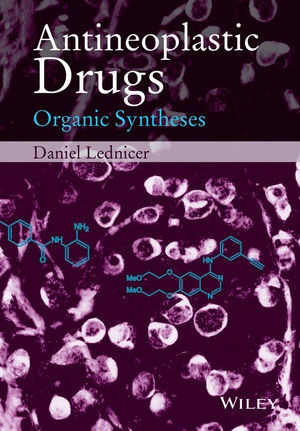Read more
Informationen zum Autor Dr Daniel Lednicer 's career in both the private and public sectors has been devoted to the search for new therapeutic agents. He spent two decades at the bench as a chemist at the Upjohn Company. Following that, he served as director of chemical research at Mead Johnson, director of pharmaceutical sciences at Adria Laboratories, and pharmaceutical manager at Analytical Biochemistry Laboratories. Most recently, he was a project officer at the National Cancer Institute. Dr Lednicer is the acclaimed author of several books on drug synthesis and discovery, including 7 volumes of the series Organic Chemistry of Drug Synthesis (Wiley US). Klappentext The past decade has seen a significant increase of research aimed at discovering new drugs for treating cancer, and the increasing number of new antineoplastic drugs approved by regulatory agencies reflects this. Until now, details on the synthesis of these newer agents have been scattered in various journals and in US and European patents. This timely volume deals with the organic chemistry involved in the synthesis of the agents found within antineoplastic drugs, including descriptions of the synthetic schemes for the preparation of over 200 compounds that have been granted non-proprietary names. Compounds are collected in chapters based on the mechanism of action rather than on their chemical structures. Each individual chapter is preceded by a brief description of that mechanism and includes detailed flow charts of the preparation of those compounds accompanied by discussions of the organic chemistry involved in each step. The first half of this volume is dedicated to the syntheses of established chemotherapy drugs. Kinase inhibitors occupy the following chapters with the largest single chapter dealing with the fifty compounds that inhibit tyrosine kinase. This class stands out since over twenty compounds in this group have been approved for treating patients; a rare track record compared to any other class of therapeutic agents. Antineoplastic Drugs: Organic Syntheses is written to appeal to organic and medicinal chemists in industry and academia. It is beneficial to those composing grant proposals for NCI and related organizations. The book is accessible to advanced undergraduates as well as graduates and researchers as well as those with a thorough grasp of organic chemistry. Zusammenfassung Deals with the organic chemistry involved in the synthesis of the agents found within antineoplastic drugs, including descriptions of the synthetic schemes for the preparation of over 200 compounds that have been granted non-proprietary names. This volume also focuses on the syntheses of established chemotherapy drugs. Inhaltsverzeichnis Preface ix Introduction xi 1 Alkylating Agents 1 1.1 bis-Chloroethyl Amines 1 1.2 Several Other Chloroethyl Agents 5 1.3 Platinum-Based Antineoplastic Agents 6 1.4 Miscellaneous Alkylating Agents 8 2 Antimetabolites 13 2.1 Introduction 13 2.2 Folate Antagonists 14 2.3 Pyrimidines and Purines 21 3 Hormone Blocking Anticancer Drugs 31 3.1 Introduction 31 3.2 Estrogen Antagonists 32 3.3 Androgen Antagonists 44 4 Topoisomerase Inhibitors 55 4.1 Introduction 55 4.2 Anthracyclines 56 4.3 Anthraquinones and Anthrapyrazoles 59 4.4 Camptothecins 65 4.5 Miscellaneous Topoisomerase Inhibitors 74 5 Mitotic Inhibitors 81 5.1 Introduction 81 5.2 Taxanes 82 5.3 Wholly Synthetic Compounds 86 6 Matrix Metalloproteinase Inhibitors 97 6.1 Introduction 97 6.2 Hydroxamates 98 7 Histone Deacetylase Inhibitors 109 7.1 Introduction 109 7.2 Hydroxamates 110 7.3 Phenylenediamines 113 8 Enzyme Inhibitor, Part I, Tyrosine Kinases...

